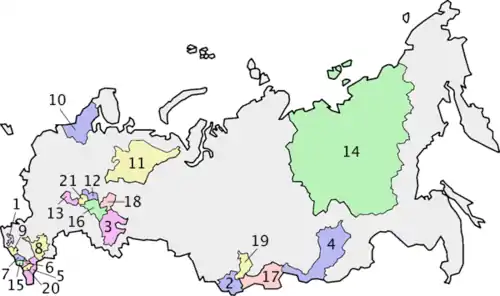Komi
English

Etymology
An endonym, used by the Finno-Permic Komi people to refer to themselves. It has been compared to Uralic terms for "man" or "human", such as Samoyed qum. An alternative explanation derives it from the name of the River Kama[1], but if there's any relation, it might as well be vice versa. The word can also be compared to the Finnish komea (“handsome, beautiful”).
Proper noun
Komi
- A Finno-Ugric language currently spoken by 200,000 to 400,000 people, depending on source and definition of "speaker", in northeastern European part of Russia.
- Komi Republic (a republic of Russia)
Usage notes
The ISO 639-3 regards Komi (language code kom) as a macrolanguage consisting of two closely related main variants, Komi-Zyrian (kpv) and Komi-Permyak (koi). Komi-Zyrian is an official language in the Komi Republic along with Russian. The Komi-Permyak is mainly spoken in Komi-Permyak Okrug, which does not belong to Komi Republic. The terminology is somewhat confusing as there's cross-usage between Komi, Zyrian and Komi-Zyrian. There are other variants among which at least Komi-Yazva is recognized as language by some sources (not by ISO 639 as of Apr 2014).
Synonyms
- (language): Zyrian, Zyryan
Hypernyms
Hyponyms
Translations
Noun
Komi (plural Komis)
- An ethnic group chiefly consisting of Komi speakers and descendants of Komi speakers who don't speak the language.
- A member of that ethnic group.
- 2009, Diarmaid MacCulloch, A History of Christianity, Penguin, page 519:
- In 1376 he set out to establish his mission among the Komi people of the Perm’ region, and achieved enough success for the Metropolitan to make him bishop […] .
-
Synonyms
- (person): Zyrian
Translations
- The translations below need to be checked and inserted above into the appropriate translation tables, removing any numbers. Numbers do not necessarily match those in definitions. See instructions at Wiktionary:Entry layout#Translations.
See also
- Syktyvkar (capital of Komi)
References
- see K. Redei in R. Khanam (editor), Encyclopaedic ethnography of Middle-East and Central Asia, volume 1, 2005, page 451
Further reading
- ISO 639-1 code kv, ISO 639-3 code kom
- Ethnologue entry for Komi-Permyak, koi
- Ethnologue entry for Komi-Zyrian, kpv
Finnish
Declension
| Inflection of Komi (Kotus type 5/risti, no gradation) | |||
|---|---|---|---|
| nominative | Komi | Komit | |
| genitive | Komin | Komien | |
| partitive | Komia | Komeja | |
| illative | Komiin | Komeihin | |
| singular | plural | ||
| nominative | Komi | Komit | |
| accusative | nom. | Komi | Komit |
| gen. | Komin | ||
| genitive | Komin | Komien | |
| partitive | Komia | Komeja | |
| inessive | Komissa | Komeissa | |
| elative | Komista | Komeista | |
| illative | Komiin | Komeihin | |
| adessive | Komilla | Komeilla | |
| ablative | Komilta | Komeilta | |
| allative | Komille | Komeille | |
| essive | Komina | Komeina | |
| translative | Komiksi | Komeiksi | |
| instructive | — | Komein | |
| abessive | Komitta | Komeitta | |
| comitative | — | Komeineen | |
Polish
Pronunciation
- IPA(key): /ˈkɔ.mʲi/